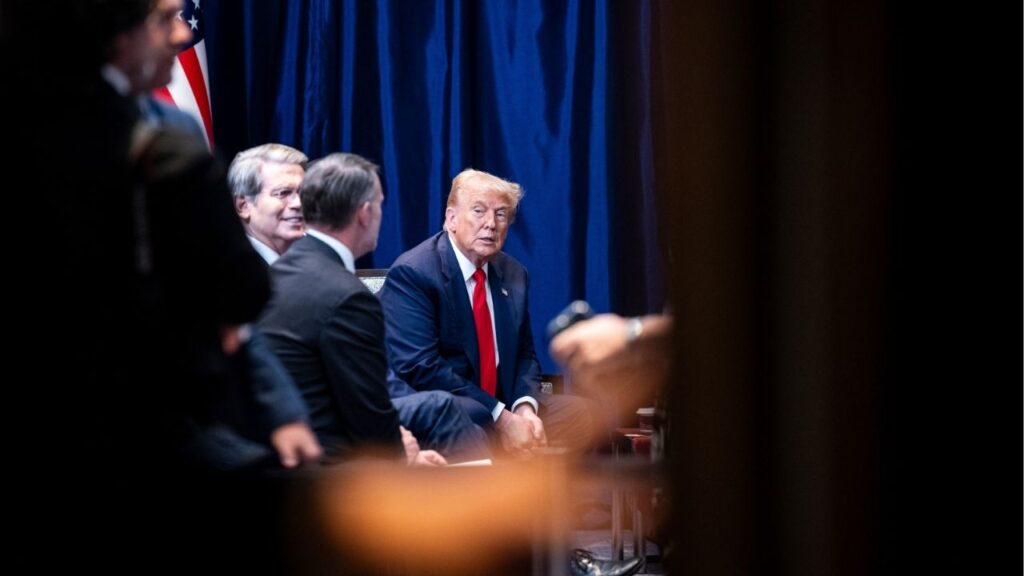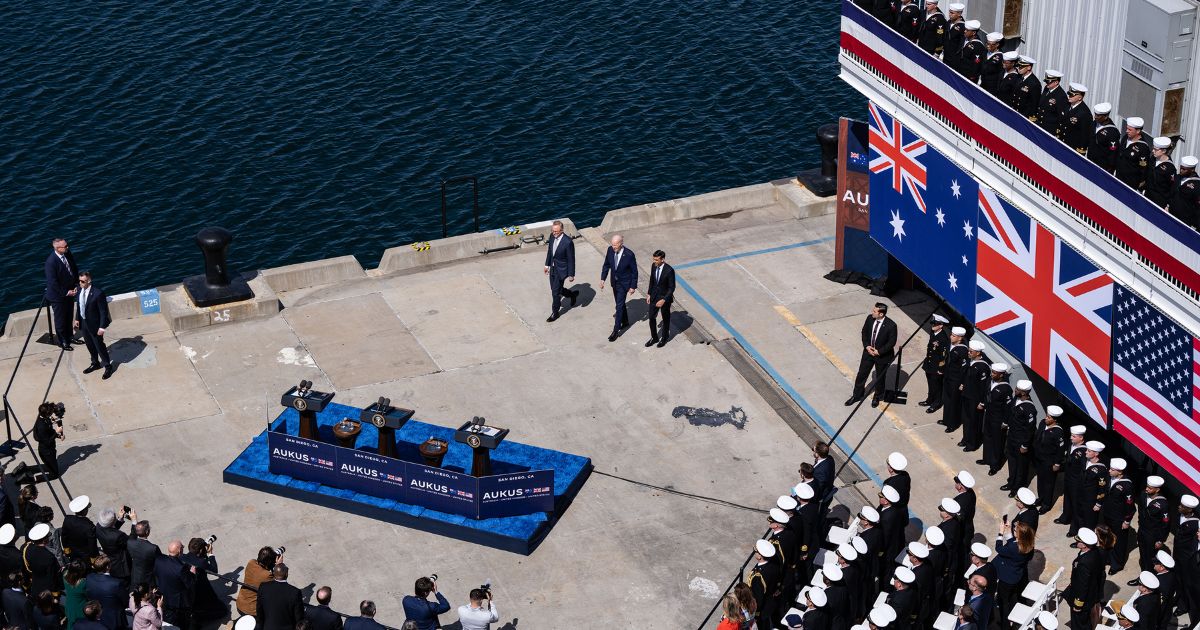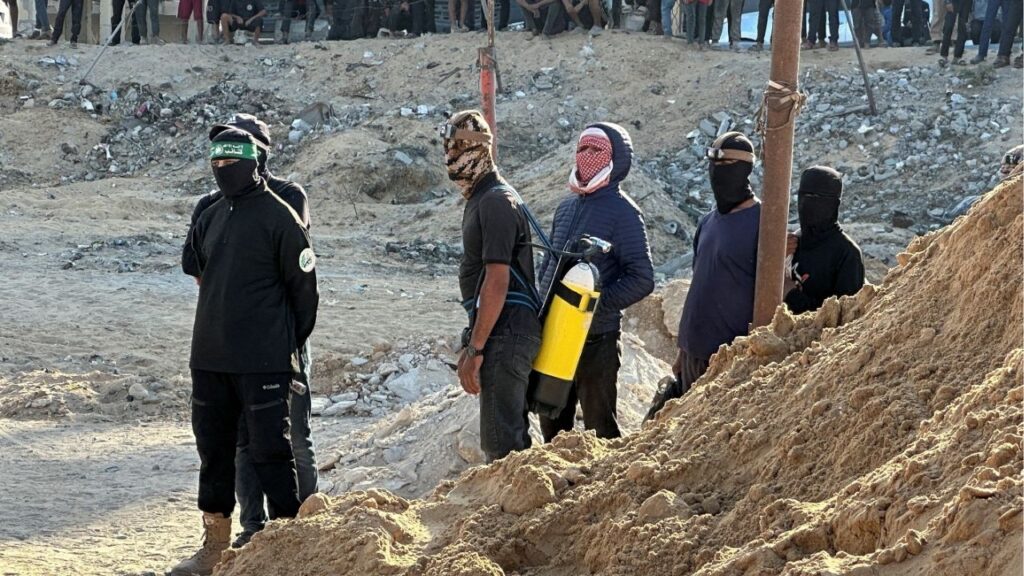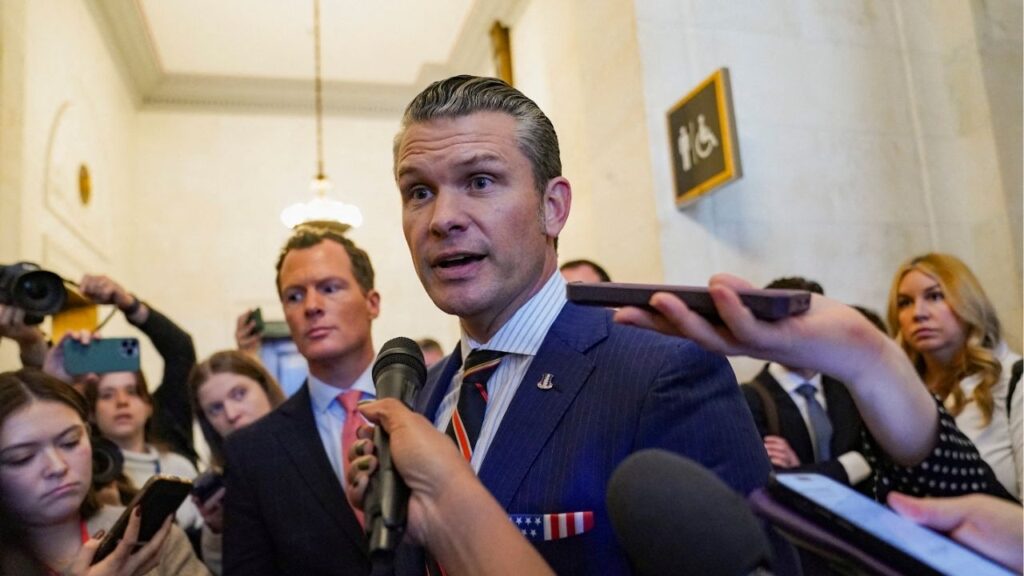President Joe Biden, Australian Prime Minister Anthony Albanese and UK Prime Minister Rishi Sunak gather in San Diego on March 13, 2023, to discuss AUKUS, the 2021 compact that brought the three countries together to codevelop nuclear propelled submarines and other technologies. The three nations have agreed to exempt each other from a vast array of export controls for defense technology. (Haiyun Jiang/The New York Times)

- Australia, U.S., and Britain to ease defense technology export controls, enhancing collaboration and trade under AUKUS.
- The new framework removes licensing for over 70% of U.S. exports to Australia, including munitions and dual-use technologies.
- Critics warn of risks like espionage and overregulation, while supporters hope for innovation and increased defense production.
Share
|
Getting your Trinity Audio player ready...
|
SYDNEY — Australia, the United States and Britain have agreed to exempt each other from a vast array of export controls for defense technology, making it easier to trade and collaborate on weapons development and production.
The trilateral arrangement, announced Thursday, is an outgrowth of AUKUS — the 2021 compact that brought the three countries together to codevelop nuclear-propelled submarines and other advanced technologies. It will harmonize the ground rules for companies in all three nations, removing many obstacles to sharing while holding onto controls for the most sensitive technologies and, in some cases, toughening punishment for violations.
Australian and U.S. officials called it an important step toward modernizing an outdated approach to technology at a time when China has been making rapid advances and the United States struggles to produce the weapons demanded by a contentious world.
Related Story: Americans Give Harris an Advantage Over Trump on Honesty and Discipline, an ...
The Weapons Affected
Australian officials said that the new legal framework will allow license-free trade for more than 70% of the exports from the United States to Australia that currently fall under what is known as ITAR, for International Traffic in Arms Regulations, and 80% of the trade subject to U.S. Export Administration Regulations, which cover less sensitive products.
While some details are still in flux, equipment removed from the licensing requirements would likely include traditional munitions, like the artillery shells Australia is already producing to help replenish stockpiles that have been depleted by the wars in Ukraine and the Gaza Strip. Some technologies that have both military and civilian uses, such as sensors and propulsion systems, will also get exemptions across all three partner countries.
The most strategically important technologies would still require licensing — including nuclear propulsion and quantum navigation systems, which use quantum physics rather than satellites to determine location. Officials in Australia have said they hope these can be exempted if and when they move from research to the production phase.
Related Story: Fed up Americans Fight Inflation by Refusing to Pay Higher Prices
The Risks
More sharing could mean more opportunities for espionage or leaks to adversaries.
To get Thursday’s arrangement approved by the U.S., Australia and Britain passed laws and approved new rules to create a standard of protection roughly in line with the United States. Australia has gone even further: Violations are now subject to “absolute liability,” which means accidental sharing — an errant email — could lead to prison.
Critics in the defense industry argue that approach highlights another risk: overregulation. Some have expressed concern that fears of punishment will undermine recruiting and create a chilling effect on collaboration.
There are also complaints that Thursday’s agreement did not alter the U.S. laws that effectively prohibit many immigrants from sensitive work because they treat the transfer of export-controlled technology to a foreign worker in the U.S. as an export to that person’s country. Now all three AUKUS nations have similar rules.
Some experts said even more technologies need to be exempt from export restrictions. For instance, ITAR licensing is still required for weapons like autonomous underwater drones that could be needed in large numbers if there was ever a conflict with China over Taiwan, the self-governed island that China considers its own.
“The goal in changing these regulations is to produce greater collaboration, innovation and investment into defense capabilities,” said Charles Edel, Australia chair at the Center for Strategic and International Studies. “Ultimately, the effectiveness of these changes will depend less on what the three governments say and more on how the private sector reacts to these changes.”
Related Story: A Win for the Harris-Walz Ticket Would Also Mean the Country’s First ...
The Potential Benefits
Supporters believe that streamlining the framework for defense production across all three allies could be a catalyst for revolutionary collaboration.
They imagine a scenario in which competition and collaboration delivers greater innovation and production capacity at a time when China may already be ahead of the U.S. with technologies like hypersonic missiles and quantum computing.
McCaul, in an interview in Australia this week, said the American production system “is to some extent broken,” with long delays and high costs centered around Defense Department procurement requests and layers of regulations.
He said he hopes that deals like AUKUS will allow companies to develop and bring new ideas to defense officials in all three countries and, eventually, maybe to an even larger group.
Japan and other U.S. allies have also expressed an interest in being part of the same new, more open approach that AUKUS has set out to develop.
–
This article originally appeared in The New York Times.
By Damien Cave/Haiyun Jiang
c.2024 The New York Times Company
RELATED TOPICS:
Categories

Beyond Trade War, China’s Xi Looks to Press Trump on Taiwan

Senator Schumer Sees US Shutdown Stretching Into November


















